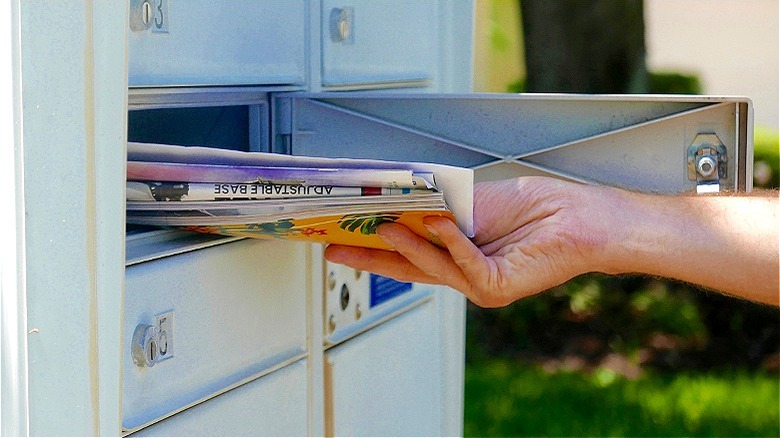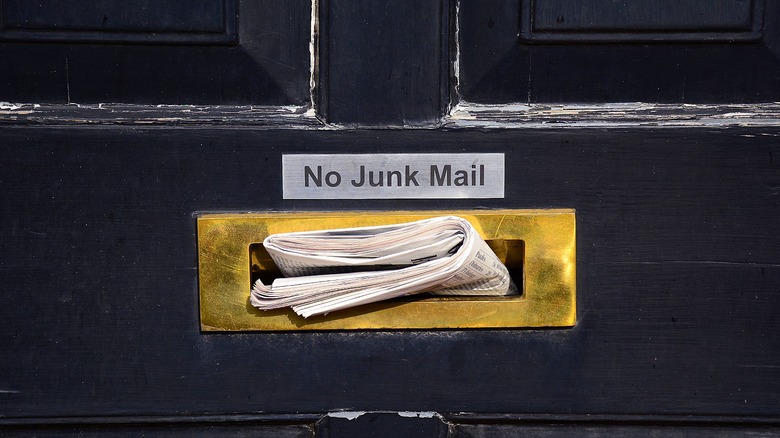Ways To Stop Receiving Credit Card Junk Mail
Tired of getting a constant stream of junk mail from the credit card companies? From preapproved card offers to solicitations encouraging you to apply for a revolving credit account, it can be really irritating to check your mailbox and find envelope after envelope filled with stuff like this that you don't want or need. Sure, you can just throw away or recycle credit card junk mail, but dealing with it is a waste of time and energy. After all, you shouldn't really just toss this kind of junk mail into the trash or recycle bin as-is. Instead, you should take the time to shred this type of mail to make sure that credit card offers (especially preapproved ones) with your name and address don't fall into the hands of identity thieves.
The good news is that you can put a stop (or nearly so) to getting such junk mail from credit card companies. Rather than continuing to waste your time sorting through unwanted credit card promos, spend a little time getting your name removed from solicitation lists. Once you do that, the credit card offers in your mailbox will start to slow down and may even eventually stop completely. Doing this now will save you time, along with frustration, in the long run. Ready to start cutting down on junk mail from credit card companies? It's surprisingly easy to request removal from their mailing lists.
Call the opt-out hotline
Credit card companies often use information they get from consumer credit reporting agencies to select consumers to receive preapproved credit card offers, referred to as firm offers of credit. You may not like the fact that the credit bureaus can share information about your credit in this way, but they're allowed to do so under the provisions of the Fair Credit Reporting Act. Not only can these credit bureaus share your data with credit card companies, but they can also share it with insurance companies as well. Fortunately, the FCRA also requires these businesses to provide people with a way to opt out of being sent firm credit offers by mail.
OptOutPresceen is a free service jointly provided by the four consumer credit bureaus (Equifax, Experian, TransUnion, and Innovis) that consumers can use to opt out of receiving unsolicited firm offers of credit and insurance coverage. Opting out by phone is as simple as calling 888-567-8688 (which you may find easier to remember as 888-5-OPT-OUT). You'll need to provide your name, Social Security number, address, and date of birth in order to process your request. If you want to opt out for five years, you can complete your request by phone. If you want to opt out permanently, you can start your request by phone, and OptOutPrescreen will mail you a form that you will have to complete and return.
Visit OptOutPrescreen.com to opt out
A phone call isn't the only way to stop credit reporting agencies from sharing your information with credit card and insurance companies for the purposes of making you firm offers of credit or insurance via junk mail. OptOutPrescreen also provides a way for consumers to opt out of receiving offers via its website. To opt out online, simply go to OptOutPrescreen.com/selection to start the process.
As with the phone method, you'll be able to choose between opting out permanently or for a period of five years. If you choose five years, you'll be able to complete your request via the website. If you want to opt out of firm offers from credit or insurance companies forever, you'll need to print a form from the OptOutPrescreen website, fill it out to confirm your want to permanently opt out, and then mail it. Whether you opt out via phone or online, you'll be opting out of both preapproved credit card offers and offers for insurance products (including insurance products considered a total waste of money). You can't opt out of one or the other; you're either in for both or out for both.
Note, OptOutPrescreen will only stop firm offers of credit and insurance, not general solicitations from credit card companies or other organizations that engage in direct marketing. If you don't want to receive junk mail promoting, say, credit cards with little-known perks or other such solicitations, you will need to go a step further.
Sign up for DMAChoice
If you want to cut down on the junk mail you receive from credit card companies, you may want to sign up for DMAChoice, which is a service of the Association of National Advertisers. Note that this option isn't free, but it does provide a way for you to put organizations you don't do business with on notice that you don't want them to send solicitation mailers out to you. You can pick and choose the types of companies you don't want to receive mail from; so, you can limit your selection to financial services providers only, or request to stop getting promotional mail from other types of companies.
So how much does it cost to register with DMA Choice? It's $5 if you sign up online or $6 if you mail in your request. Registering with this service covers up to five different names (or variations of the same name) at a single address for 10 years. Considering how irritating it can be to deal with junk mail, this may be a worthwhile expense. Go to the DMA choice website to register online or to get instructions for mailing in your request.
You should be aware that DMAChoice only impacts direct mail from companies you don't already do business with. Once you buy something from a company, you're then on its customer list so what it sends isn't considered prospecting for new business. You'll still get mailings from organizations if you're on their customer list or if you have otherwise signed up for their contact list, but not from those who purchase direct mail lists for prospecting purposes.
Register with the National Do Not Mail List
If you want to reduce junk mail overall (rather than trying to just cut back on credit card junk mail) and you'd prefer to stick with options that are free, you may find it helpful to register for the National Do Not Mail List. Unlike the National Do Not Mail Registry, the National Do Not Mail List is not operated by the government and isn't something that marketers are required to comply with. Instead, this list is provided by DirectMail.com, which is a direct-mail company. The list is a service to both consumers who are bothered enough by junk mail to ask not to get it, and to marketing companies looking to avoid spending money mailing offers to people who are just going to toss promotional mail directly into the trash.
It's easy to add your name to the National Do Not Mail list, and, again, it doesn't cost you anything to do so. Simply go to DirectMail.com/mail_preference/ and fill out the online form. You'll need to provide your name, address, phone number, and email address, but not your Social Security number. DirectMail.com makes the list available only to those who own and/or use mailing lists solely for the purpose of removing individuals who don't wish to receive any promotions by mail. Although direct marketers aren't required to use this list, it's in their best interest to do so, as it helps them make the most of their marketing budget.
Does signing up stop the junk mail entirely?
Wondering if it's worth your time to take these actions? Each sign-up only takes a few minutes to complete, so there's really no reason not to ask to opt out of credit card junk mail. Of course, signing up for these services doesn't guarantee you'll never receive credit card junk mail again. However, you are likely to see a significant reduction in this type of mail after you add your name to these lists.
This said, you probably won't see a drastic change immediately. It'll probably take a while for the flow of credit card promotions to slow down, as your name won't instantly disappear from lists you're already on. However, as credit card marketers update their mailing lists over time, you should see a change to your mailbox. The more credit card offers and junk mail opt-out services you add your name to, the fewer offers you're likely to continue receiving.





